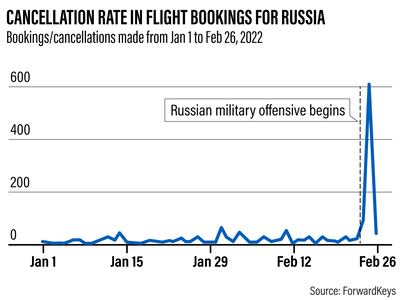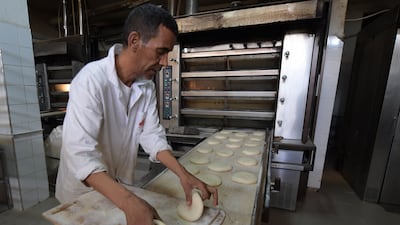Live updates: follow the latest news on Russia-Ukraine
Russia's military offensive in Ukraine could affect global food supplies, worsen shipping snarls and threaten the fragile recovery of the pandemic-hit travel industry, experts say.
A prolonged conflict is heightening worries about global food inflation and hunger, UN agency International Fund for Agricultural Development (IFAD) said in a statement on Thursday.
“We are very concerned that an extended conflict in Ukraine could limit the world’s supply of staple crops like wheat, corn and sunflower oil, resulting in the skyrocketing of food prices and hunger,” Rome-based IFAD said. “This could jeopardise global food security and heighten geopolitical tensions.”

Russia and Ukraine are two of the world's major staple grains markets, and the conflict is prompting countries that rely on imports from them to seek alternative suppliers.
The Black Sea plays a major role in the global food trade, exporting at least 12 per cent of the food calories traded in the world, according to IFAD. Russia and Ukraine account for more than a quarter of global wheat trade and nearly a fifth of corn trade.
“The continuation of this conflict, already a tragedy for those directly involved, will be catastrophic for the entire world, and particularly those that are already struggling to feed their families,” the agency warned.
Shipping disruptions worsen
With Ukraine's ports closed, the conflict has also triggered shipping turmoil in the Black Sea.
“Due to continuing disruption to shipping in the Black Sea, we expect container build-ups at ports to exacerbate at storage areas across the region,” technology company Container xChange said in a statement on Thursday.
The world's biggest shipping lines, MSC and Maersk, suspended container shipping to and from Russia (excluding foodstuff, medical and humanitarian supplies), joining a growing list of companies that have halted operations in the country in response to western sanctions on Moscow.
“Russian and Belarusian ports in the Baltic and Black Sea will likely see a build-up of boxes if carriers refuse to make port calls due to the security situation and sanctions,” Container xChange said.
Some Russian banks have also been barred from the Swift global financial network.
“The full implications of sanctions are not yet clear but the closure of the Swift system to Russia will make payments from Russian partners more difficult,” Container xChange said.
Maritime trade with Russia and Russian businesses could be “very difficult” in the months and even years to come.
“We expect this awful war to add to the stretched nature of global container supply chains, bringing yet more inflation, disruption and delays,” it said.
Last year, the world struggled with supply chain bottlenecks caused by surging demand for retail goods transported on container ships amid pandemic-related lockdowns.
The indirect impact of sanctions is now putting further pressure on global freight, analysts said.
“Overall, the situation for container availability is likely to worsen, but this will vary by port and region. Central and Northern Europe is already congested, and any further trigger to the cargo flow will only worsen the state of container pile-ups,” Container xChange said.
Flight cancellations spike
Another industry that has seen an impact is travel. The conflict prompted an instant spike in flight cancellations to and from Russia, according to data from travel trends firm ForwardKeys. On February 25, the day after the start of the military offensive in Ukraine, every booking that was made for travel to Russia was outweighed by six cancellations of pre-existing bookings.
Source markets showing the highest cancellation rates, in order of volume, were Germany, France, Italy, UK, India and Turkey, it said.

The conflict also triggered a collapse in the market for Russian outbound travel. Destinations that suffered the highest immediate cancellation rates, in the period February 24 — 26, were Cyprus, Egypt, Turkey, the UK, Armenia and the Maldives, it said.
A collapse in Russian travel will also have damaging consequences on tourism-dependent economies. Countries likely to see the biggest impact include Armenia, which depends on Russia for 47 per cent of all visitors, Azerbaijan, Uzbekistan, Bulgaria, the Seychelles, Maldives and Cyprus.
“The outbreak of war always has a hugely damaging impact on the travel industry; and that is what we are seeing here, with mass cancellations in flight bookings to and from Russia,” Olivier Ponti, vice president of Insights at ForwardKeys, said.
“The Russian tourism economy was beginning to revive from the pandemic, and it will now experience another substantial blow.”
The ForwardKeys data does not yet contain the impact of sanctions, “which is bound to make the picture worse”, he said.
European countries have closed their airspace to Russia's private and commercial aircraft and plane makers Airbus, Boeing and Embraer have suspended the sale of parts and support services to airline customers in Russia.
“Of course, should there be a ceasefire and successful peace talks, the outlook for travel should improve,” Mr Ponti said.

















